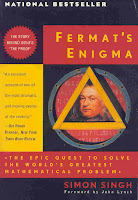Youngblood: Faith and reason

Fermat's Enigma by Simon Singh FAITH is reasonable, while science, to some extent, is founded on faith. These are two conclusions I made after pondering the relationship between faith and science. It was a "mathematical novel" I read recently that influenced me to undertake the exercise. The book, titled "Fermat's Enigma," was written by Simon Singh, a Ph.D. in particle physics at the University of Cambridge. It tells of the epic quest to solve Fermat's Last Theorem, regarded as the greatest mathematical problem of all times. I could say that the exercise led me to some rather startling discoveries. (Click here for a brief explanation on Fermat's Last Theorem ) First, not everything in science has a proof. In fact, the whole of math, an abstract branch of science, is founded on statements that are so fundamental that they do not have proofs! These statements, called axioms, are either self-evidently true or else are assumed to be true. Perso...




